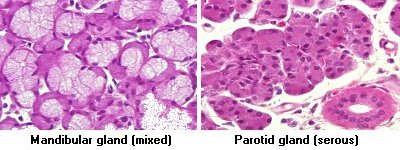VIVO Pathophysiology
Salivary Glands and Saliva
Saliva is produced in and secreted from salivary glands. The basic secretory units of salivary glands are clusters of cells called an acini. These cells secrete a fluid that contains water, electrolytes, mucus and enzymes, all of which flow out of the acinus into collecting ducts.
Within the ducts, the composition of the secretion is altered. Much of the sodium is actively reabsorbed, potassium is secreted, and large quantities of bicarbonate ion are secreted. Bicarbonate secretion is of tremendous importance to ruminants because it, along with phosphate, provides a critical buffer that neutralizes the massive quantities of acid produced in the forestomachs. Small collecting ducts within salivary glands lead into larger ducts, eventually forming a single large duct that empties into the oral cavity.
Most animals have three major pairs of salivary glands that differ in the type of secretion they produce:
- parotid glands produce a serous, watery secretion
- submaxillary (mandibular) glands produce a mixed serous and mucous secretion
- sublingual glands secrete a saliva that is predominantly mucous in character
The basis for different glands secreting saliva of differing composition can be seen by examining salivary glands histologically. Two basic types of acinar epithelial cells exist:
- serous cells, which secrete a watery fluid, essentially devoid of mucus
- mucous cells, which produce a very mucus-rich secretion
Acini in the parotid glands are almost exclusively of the serous type, while those in the sublingual glands are predominantly mucus cells. In the submaxillary glands, it is common to observe acini composed of both serous and mucus epithelial cells.

In the histologic sections of canine salivary gland shown above, the cells stained pink are serous cells, while the white, foamy cells are mucus-secreting cells.
Secretion of saliva is under control of the autonomic nervous system, which controls both the volume and type of saliva secreted. This is actually fairly interesting: a dog fed dry dog food produces saliva that is predominantly serous, while dogs on a meat diet secrete saliva with much more mucus. Parasympathetic stimulation from the brain, as was well demonstated by Ivan Pavlov, results in greatly enhanced secretion, as well as increased blood flow to the salivary glands.
Potent stimuli for increased salivation include the presence of food or irritating substances in the mouth, and thoughts of or the smell of food. Knowing that salivation is controlled by the brain will also help explain why many psychic stimuli also induce excessive salivation - for example, why some dogs salivate all over the house when it's thundering
What then are the important functions of saliva? Saliva serves many roles, some of which are important to all species, and others to only a few:
- Lubrication and binding: the mucus in saliva is extremely effective in binding masticated food into a slippery bolus that (usually) slides easily through the esophagus without inflicting damage to the mucosa. Saliva also coats the oral cavity and esophagus, and food basically never directly touches the epithelial cells of those tissues.
- Solubilizes dry food: in order to be tasted, the molecules in food must be solubilized.
- Oral hygiene: The oral cavity is almost constantly flushed with saliva, which floats away food debris and keeps the mouth relatively clean. Flow of saliva diminishes considerably during sleep, allow populations of bacteria to build up in the mouth -- the result is dragon breath in the morning. Saliva also contains lysozyme, an enzyme that lyses many bacteria and prevents overgrowth of oral microbial populations.
- Initiates starch digestion: in most species, the serous acinar cells secrete an alpha-amylase which can begin to digest dietary starch into maltose. Amylase is not present, or present only in very small quantities, in the saliva of carnivores or cattle.
- Provides alkaline buffering and fluid: this is of great importance in ruminants, which have non-secretory forestomachs.
- Evaporative cooling: clearly of importance in dogs, which have very poorly developed sweat glands - look at a dog panting after a long run and this function will be clear.
Diseases of the salivary glands and ducts are not uncommon in animals and man, and excessive salivation is a symptom of almost any lesion in the oral cavity. The dripping of saliva seen in rabid animals is not actually a result of excessive salivation, but due to pharyngeal paralysis, which prevents saliva from being swallowed.
Send comments to Richard.Bowen@colostate.edu

